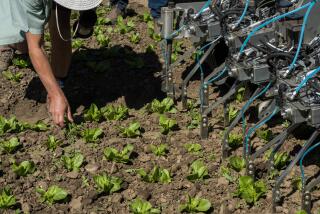U.S. Agriculture Biotech Firms Cut Good Deals With Japanese : Ventures: Agreements once were a one-way street, with technology being transferred from here to there. Today, they are much more equitable.
- Share via
For the past month, Calgene Inc., a Davis, Calif.-based firm specializing in genetically engineered plants, has been doing more than just splicing genes. It has been grafting business deals as well.
First came the news of a $4-million agreement with Kirin Brewery Co. of Japan, announced March 15. And a week ago, the company reported that its researchers will genetically engineer disease-resistant vegetables with Sakata Seed America Inc. in a deal valued at less than $500,000.
“In the last 3 1/2 years, we’ve done over $10 million in projects with Japan,” said Kenneth Moonie, director of product planning for the agricultural biotechnology firm. “Some of that money is still being paid out over the next couple of years.”
Agricultural biotechnology is a fledgling field in which scientists work to genetically engineer plants and animals to create bio-insecticides, bio-herbicides, plants resistant to disease and pestilence and treatments for diseases.
Although Japanese investment in ag biotech is still in its early stages, industry watchers say that its growth is rapid and its future is bright. They also contend that deals such as Calgene’s symbolize the changing nature of Japanese-American business relationships--particularly in the area of technology.
In the early 1980s--the nascent stages of Japanese investment in U.S. biotechnology firms--Japanese investors would swoop in with money and out with U.S. research and broad licensing rights for future products, said Jim McCamant, who edits the AgBiotech Stock Letter and the Medical Technology Stock Letter.
Today, they are much more equitable, in part because American companies are demanding more than just a quick cash infusion in exchange for their research. And they’re getting it.
“In the agriculture area, most of the deals being done with the Japanese are good ones,” McCamant said. “Today, when you look at the deals made with Japan, you’d better ask for a lot. It’s clear you’re apt to get it.”
That’s just what happened with Calgene in the past month and Mycogen Corp., a San Diego-based bio-pesticide firm, in the past two years.
On March 15, Calgene and Kirin officials announced that the two firms had agreed to launch a joint venture in the field of potatoes. Kirin would pay Calgene $2.5 million to purchase 30% of Calgene’s seed potato business. The joint venture would consist of Kirin’s 30% share and Calgene’s 70%.
In addition, the Japanese firm agreed to fund a two-year, $1.5-million research and development project at Calgene to genetically engineer potato seed, making it resistant to disease and such insects as the Colorado potato beetle.
But that’s not all. Kirin also agreed to contribute its own potato propagation technology to the joint venture. Moonie called that part of the deal unique, and he hasn’t gotten much argument about his characterization.
“In deals with the Japanese it’s been a one-way street, with technology being transferred from the U.S. to Japan,” Moonie said. “What the Kirin people are providing us with is their production technology, which could revolutionize the seed potato industry in the U.S.”
Mycogen is another success story, a firm that Mark Ratner, senior editor at Bio/Technology magazine, calls “a leader in truly coming to significant agreements with Japanese companies” in the area of ag biotech.
The first was in 1988 with Kubota of Tokyo, a Japanese manufacturer of farm equipment, said Jerry Caulder, Mycogen’s president, chairman and chief executive. As part of the 1988 deal, Kubota agreed to provide $6 million over three years for the development of biological insecticides.
The agreement gave Kubota exclusive rights in the Far East alone to all products developed through the collaboration. In addition, Mycogen would receive 50% of all product sales. Then in 1989, Kubota invested $10 million in the company, making Kubota a 14% shareholder. Mycogen also has a deal with Japan Tobacco Inc. for the development of bio-herbicides.
“Mycogen is separated from most (ag biotech companies) in that we didn’t do contract research,” Caulder said. “We would do deals that brought in money that augmented our core research projects. I don’t think you can build a very large profitable business . . . giving away your products for royalties.”
Tetsuo Nishide is director of machinery and technology for the Japan External Trade Organization in Los Angeles. To Nishide, the increased interest in agricultural research is partly due to problems Japanese investors have encountered while trying to break into the U.S. pharmaceutical field.
“The agriculture area is one of the perhaps most promising areas,” Nishide said. Investors “can get fruit from the investment. The medical part, it takes time to get the return because of the procedures to get approval for the medical products. The agriculture area is the easier way.”
But other industry watchers warn that Japanese investment in agricultural biotechnology should not be overstated. It’s too early, they say, and Japanese public opinion is not entirely behind the idea of genetic engineering.
The Japanese are “very well versed in ‘classical’ biotechnology techniques, especially fermenting,” Ratner said. “When it comes to genetic engineering, they still have a long way to go in terms of public acceptance.”
The government has yet to allow a field test of a genetically engineered product, he said. “Public perception of biotechnology is still straight out of those ‘50s science fiction movies, where the animal gets irradiated and turns into a giant,” Ratner said. “Instead of radiation, they’re worried about biotechnology.”







